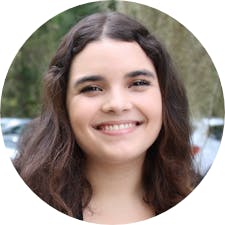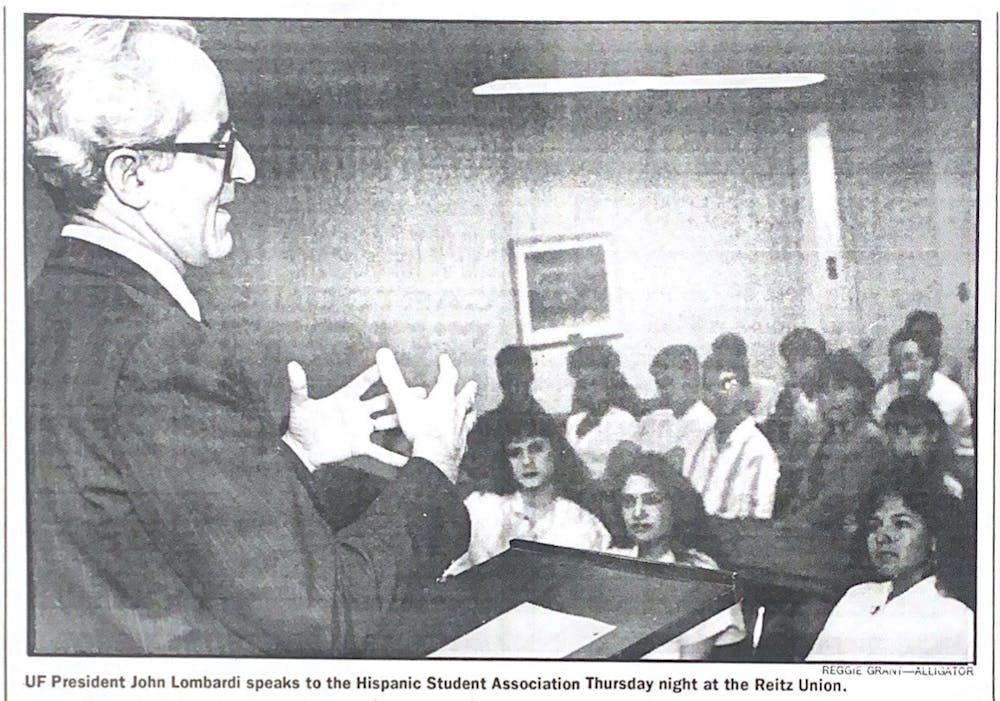In 1951, a total of 101 Hispanic and Latino students attended UF.
More than half a century later, over 9,000 Hispanic and Latinos attend UF — making up more than one-fifth of the student population.
In 1994, a growing number of Hispanic and Latino students at UF united their efforts to advocate for a dedicated space on campus.
They successfully petitioned the university for a historic house located at 1504 W. University Ave. that had once housed a fraternity and even the UF English department.
The house became known as “La Casita.”
La Casita was torn down in 2017 for structural damage, mold, termites and other issues. After three years of discussions and construction, La Casita was rebuilt as the Institute of Hispanic-Latino Cultures at the same location.
Today, La Casita serves as a hub for over 40 Hispanic Latino student organizations ranging from “cultural to graduate and from social to service,” according to its website.
Prior to the founding of La Casita, Hispanic and Latino students at UF had advocated for the interests of Latin America.
Tony Manigot, a Trinidadian UF law student, spoke out against the U.S.’ Cuban intervention Oct. 12, 1960, at a panel discussion arranged by the university's Latin American Club for Columbus Day.
“The people look for bread whether that bread comes from the capitalists or the communists,” Manigot said.
Manigot also wrote for the UF Latin American Club’s student-run publication The Latin Way, sometimes called “El Lagartito.”
In a 1962 editorial, he wrote: “Let us start right now by determining that the Latin American will become an active and resourceful member of the student body. The Latin American Club is proof enough that he is capable, but this is only the beginning. Let us carry this same forcefulness into other fields so that our years at the University of Florida will be both fruitful and memorable.”
Years later, Hispanic and Latino students have risen to the highest levels of UF student government.
Student government
UF law student Gil Sanchez became the first Latino candidate to run for student body president in 2001.
Sanchez, an active member of the UF community and Hispanic student groups, had already received offers for top-level positions in student government from established members.
“I was offered the vice president position and the treasurer position, and I said, ‘I’m not gonna be the token Hispanic and take those two positions,’'' Sanchez told the Samuel Proctor Oral History Program in 2014. “I go for all or nothing.”
Génisis Lara, a Samuel Proctor Oral History Program project coordinator, chronicled Sanchez’ story in 2014.
“Mr. Sanchez worked hard to make that something different a reality by running for Student Body President,” Lara wrote. “Having worked as a club promoter for over a year, Mr. Sanchez was able to recruit enough funds to pay the exorbitant fee that SG officials are required to pay.
Sanchez led his campaign with support from law students, his fraternity and the student organizations such as the Hispanic Student Association and the Black Student Union.
“It seemed that his dream was actually going to become a reality,” Lara wrote.
Days before the election, vandalists plastered the words “No Sp-cs for President” on the walls of La Casita.
“It felt like death after [my campaign manager] told me,” Sanchez said.
UF students, with some help from Sanchez, organized rallies and meetings in the following days to denounce racism.
Sanchez lost the election by less than 10 votes, but his efforts opened doors for Hispanic students in UF student government.
In April, Oscar Santiago Perez became UF’s first Hispanic Senate president.
Center for Latin American Studies
The Center for Latin American Studies — then known as the Institute of Inter-American Affairs — was established in 1930 to “foster better cultural and economic relations between the United States and Latin America,” according to its website.
Carlos De La Torre found a sense of home at the Center after emigrating from Ecuador to study at UF in the late 1970s. Through the Center, UF students formed Chispas, an organization dedicated to supporting Latin American causes.
Chispas’ activities ranged from teach-in lectures and lectures to parties, according to De La Torre.
“In Latin America, when you're a student, you are a student and you do politics, and the way in which I did politics here was solidarity with Central America,” he said.
After graduating from UF in 1983 with a bachelor’s in sociology and a Latin American Studies certificate, De La Torre left the university to pursue a career studying populism. While working at the University of Kentucky in 2017, De La Torre received an offer to return to the Center for Latin American Studies at UF — this time, as director.
He accepted.
“What I love about my position, in my job, is that Latin America really matters,” he said. “We have over 200 affiliates, from many departments, from all of the colleges around campus from medicine to engineering. So Latin America is very important.”
De La Torre added that Latin American student life has changed since he was at the university.
While Latin American students at UF once formed through centralized organizations like Chispas, there are now country-specific student groups, he said.
With over 20 student organizations at UF under the Hispanic Student Association alone, Hispanic and Latino UF students hope to continue to forge representation efforts.
Student involvement
Santiago Martin, 19, knew the moment he got to UF he wanted to get involved in the Hispanic and Latino community.
“I quickly realized by meeting people in the community at HSA and HLHM events that this is where I was going to be valued and accepted the most,” the UF public relations sophomore said.
Now, Martin is the HSA General Body Meeting Director and is part of a cabinet that works to plan events, like general meetings or galas.
“One of the main goals of the Hispanic Student Association this year is to do outreach to individuals who may not even identify as Hispanic-Latinx,” Santiago said.
Santiago also said interested students should spend time at La Casita and Salita to feel more connected.
He was happy to see the student organization Gators Unidos, which provides networking and scholarship opportunities for Latino Gators, increase on-campus awareness through a merchandise campaign.
“The merchandise was branded with the slogan ‘Latino Gators, Unidos Por Siempre.’ When I saw this line of merchandise I was so proud to see my culture being celebrated and campaigned on a large scale on campus.”
As he continues to work with student organizations, he feels honored to serve the community in a meaningful way, he said.
“This community has made me feel at home like no other. I am valued and accepted for who I am,” he said. “This community has been patient and fostering with me as I learn about my culture more and more every day.”
Maria Peralta, a 21-year-old UF finance junior, grew up in Costa Rica and moved to the U.S. at 15. She felt like an outsider on campus and struggled to belong until she found a family in the Venezuelan Student Association.
“It was scary and overwhelming as a freshman,” she said. “Then I was able to find my community within the Hispanic students, which was super cool.”
During Peralta’s first year on campus, she became involved in the Hispanic Student Association and attended the Hispanic-Latinx Student Assembly where she was introduced to the Venezuelan Student Association.
“I've been very lucky to be able to be in a school where I feel empowered, and celebrated for being Hispanic,” she said.
She became involved as vice president of professional development to give back and reach out to other Hispanic students who may be feeling nervous about finding their place on campus.
Peralta feels that being surrounded by the Hispanic community is not common at other universities, she said.
“I feel like being Hispanic at UF is definitely very meaningful, and I am glad for all of the organizations that try to make it easier for Hispanic students to adapt to college,” she said.
Contact Garrett Shanley and Melanie Pena at gshanley@alligator.org and mpena@alligator.org. Follow them on Twitter at @garrettshanley and @MelanieBombino_.
Garrett Shanley is a fourth-year journalism major and the Spring 2025 university editor for The Alligator. Outside of the newsroom, you can find him watching Wong Kar-Wai movies and talking to his house plants.

Melanie Peña is a second-year business and journalism major. When she's not designing a graphic or writing an article, she's probably making jewelry or exploring coffee shops in Gainesville.





